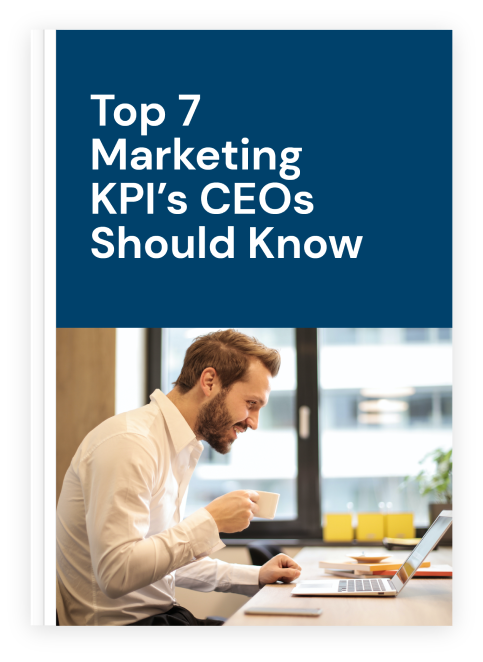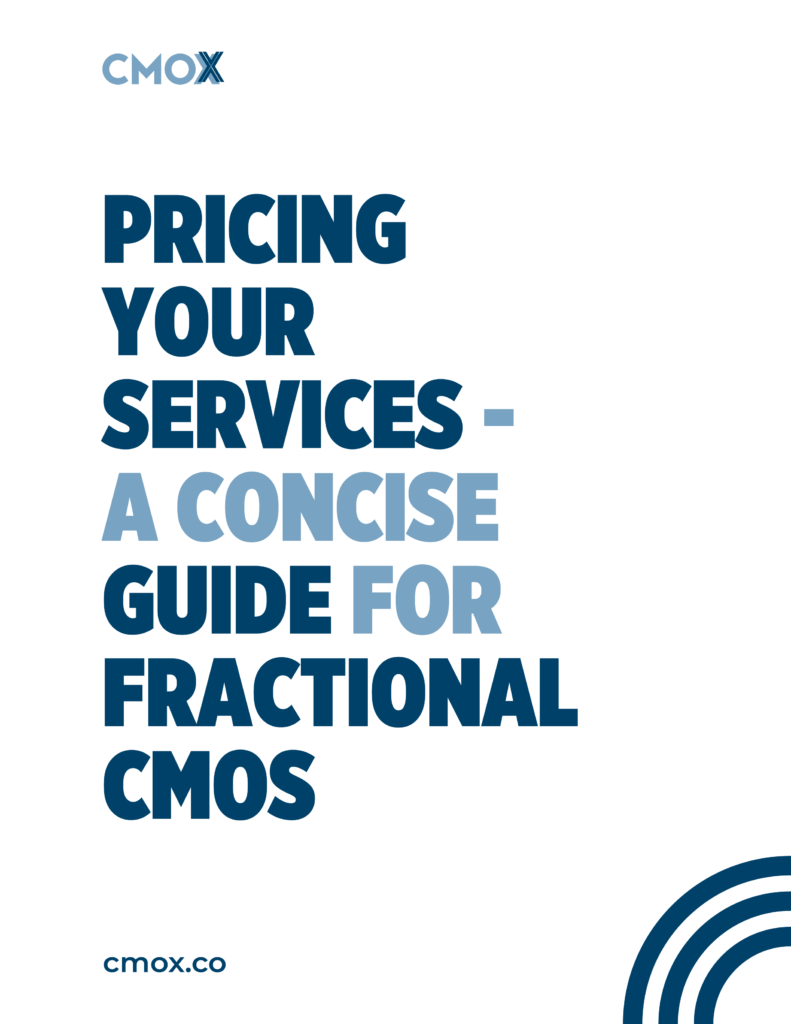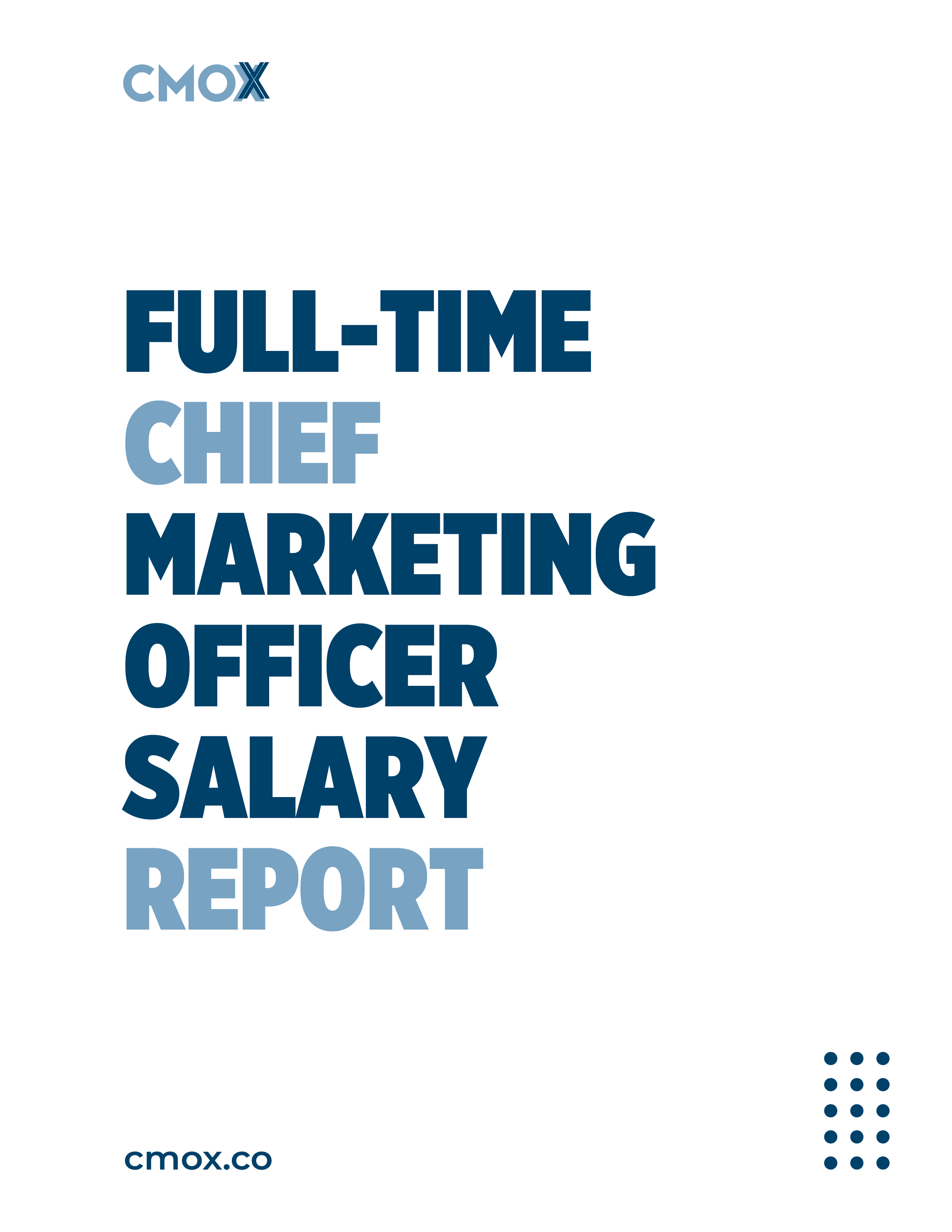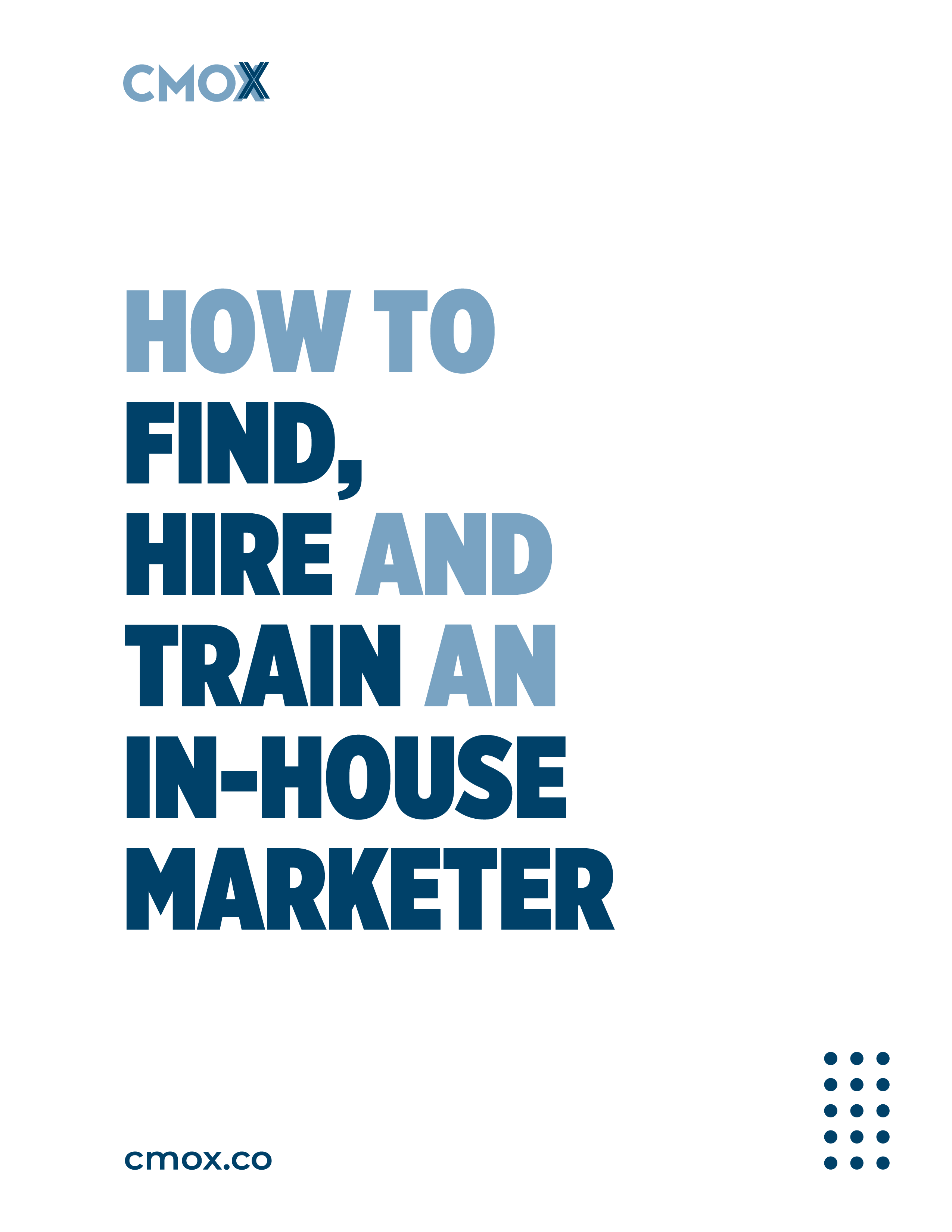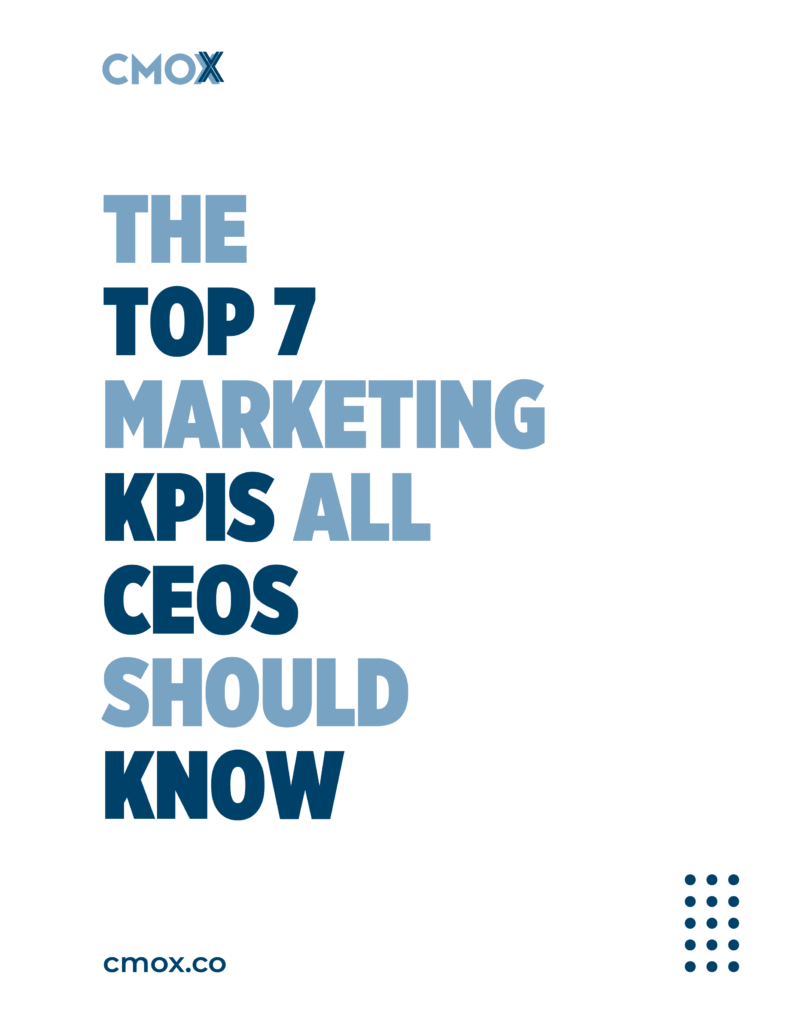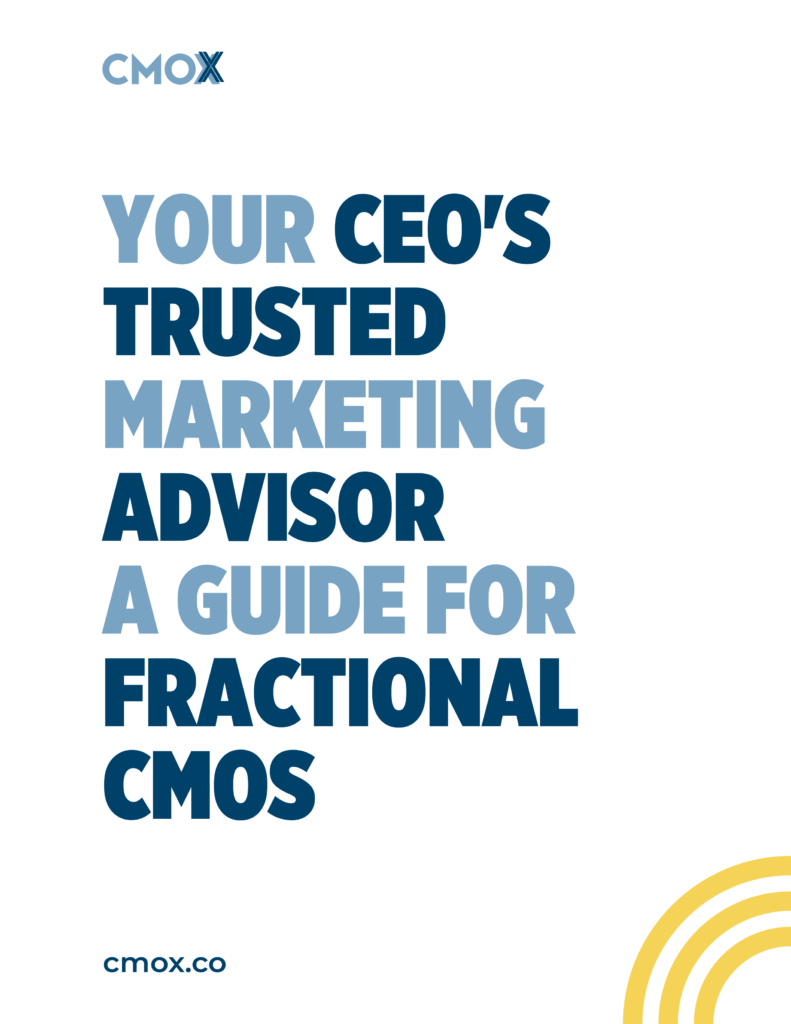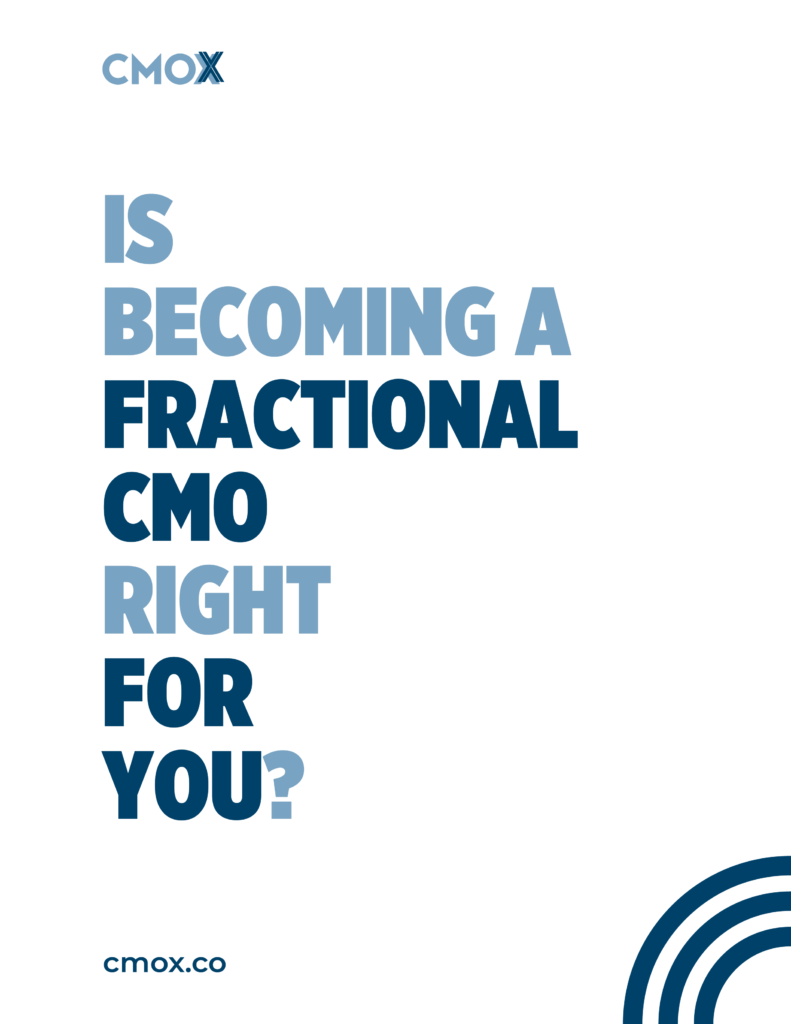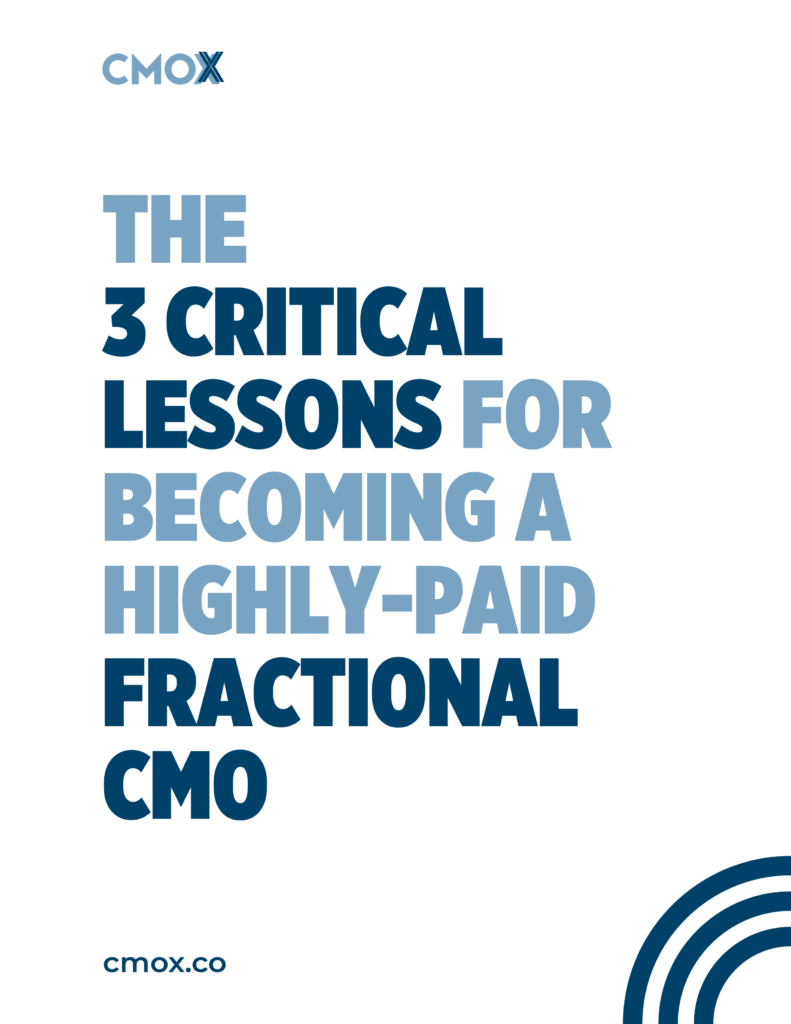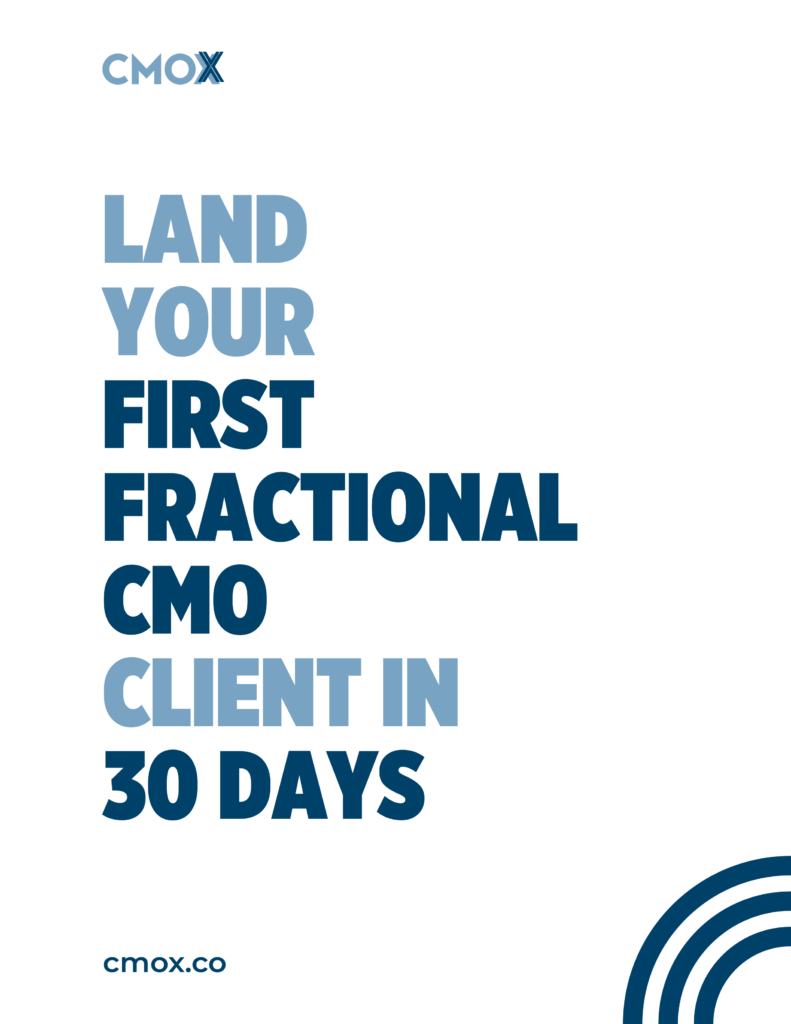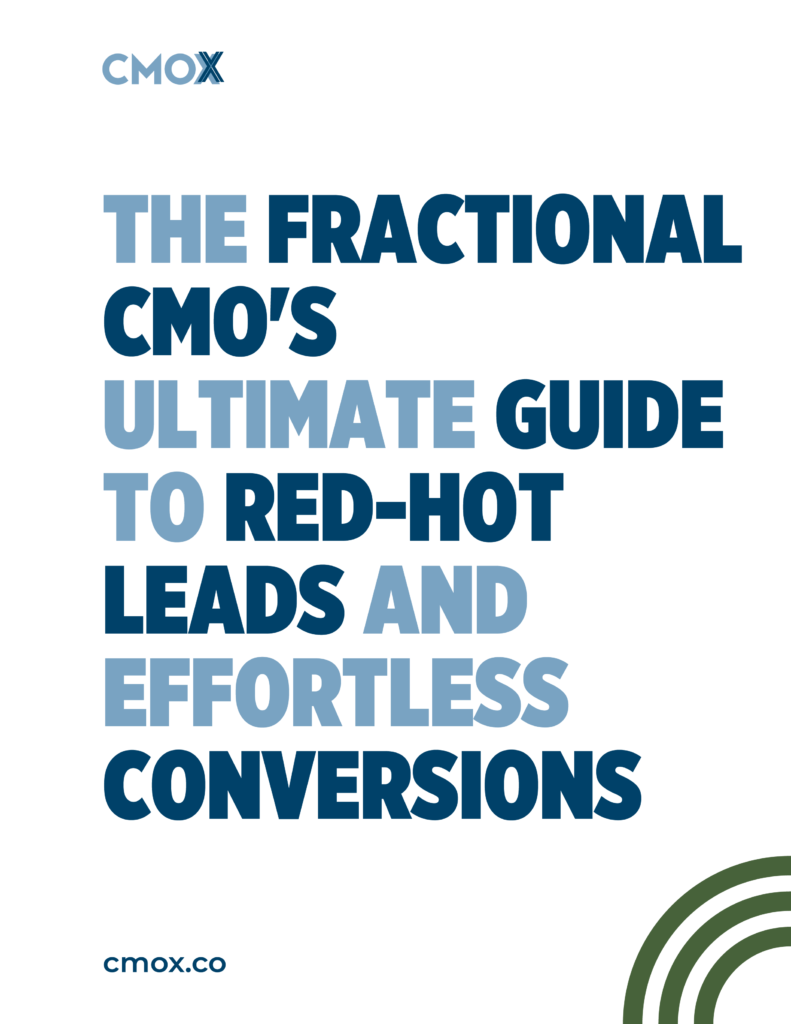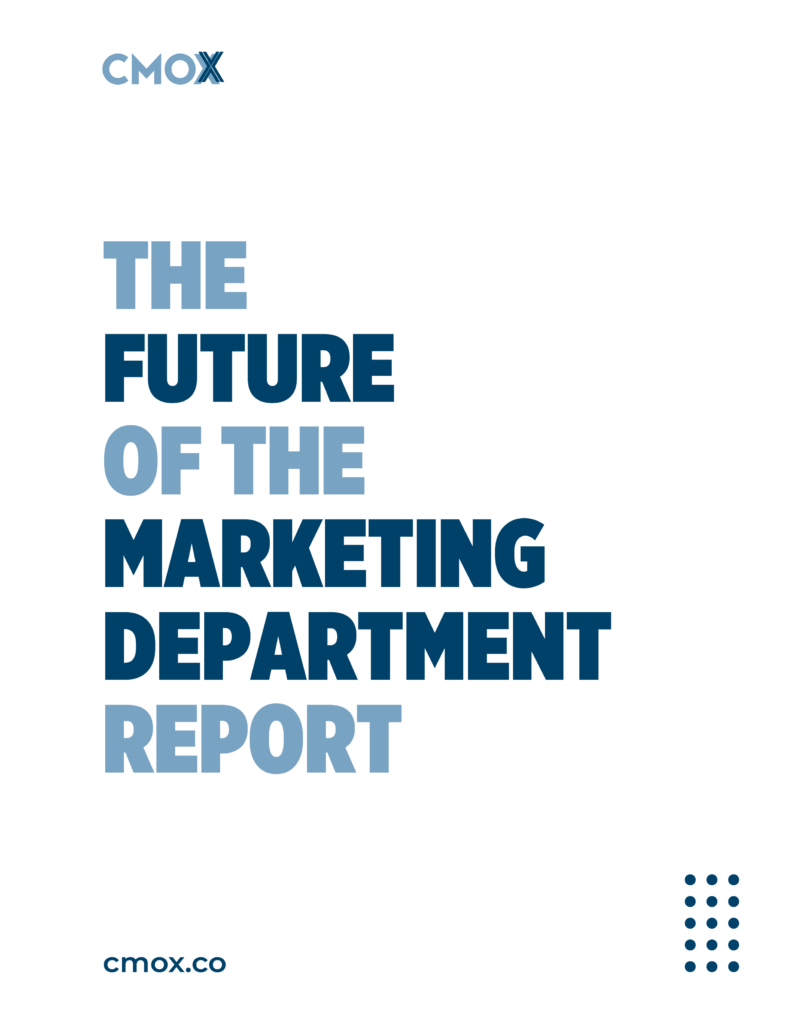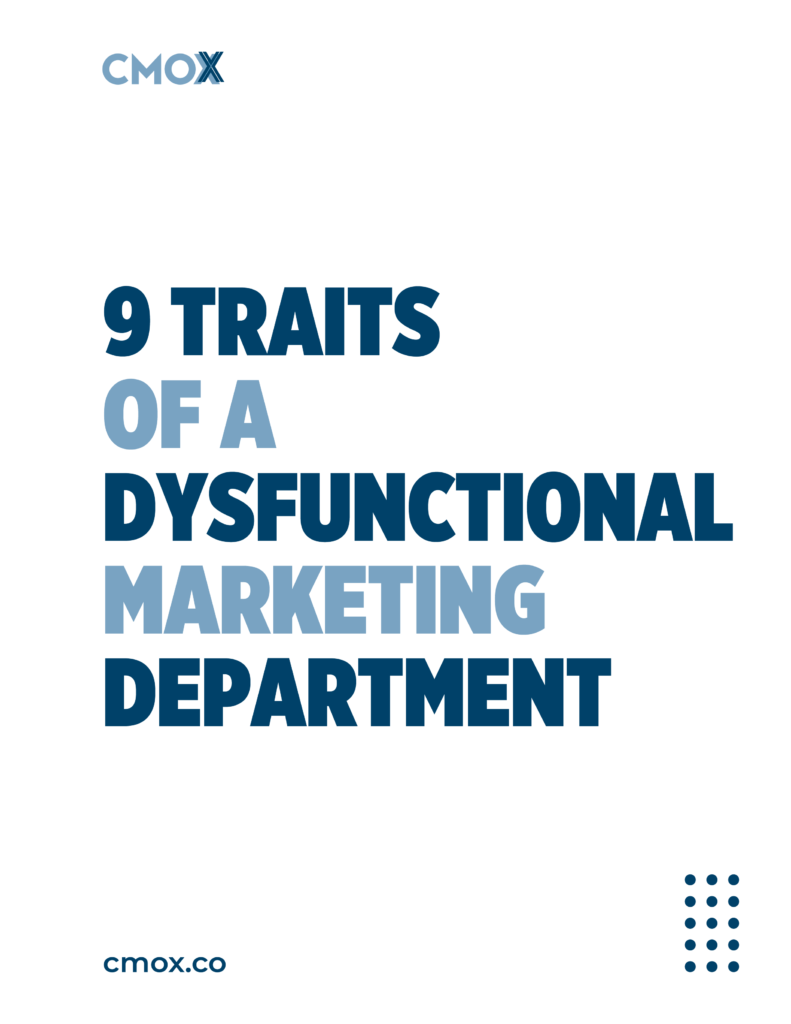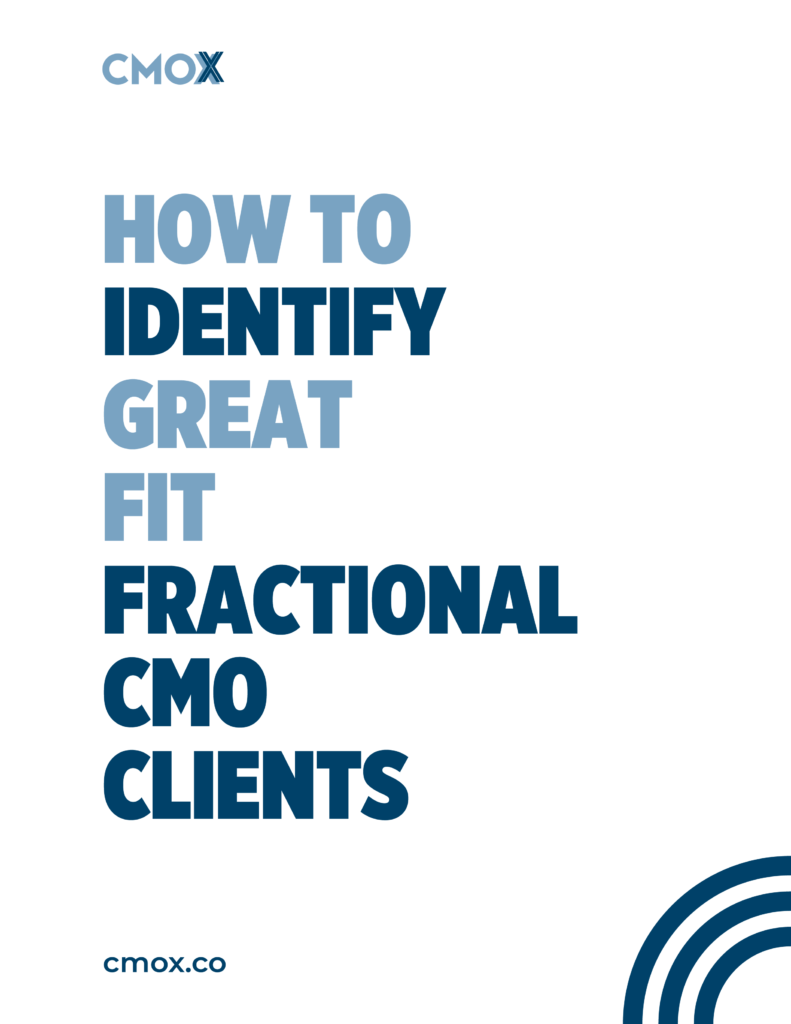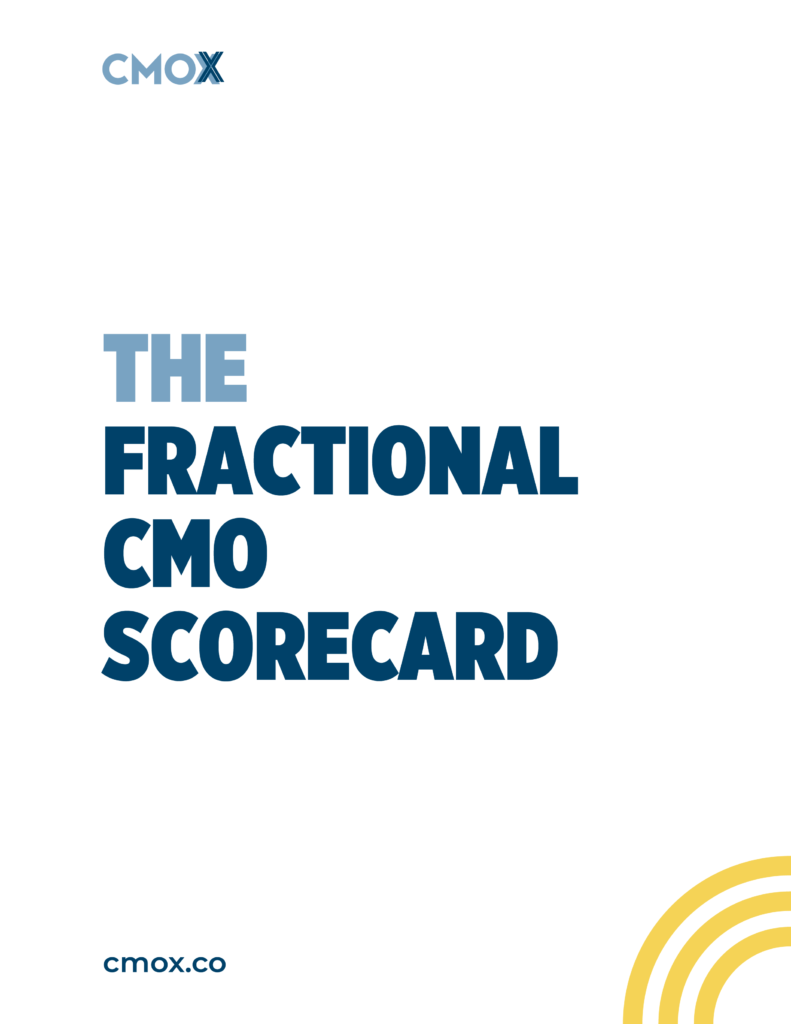Ep #112: Grow Your Authority and Income as a Fractional CMO

In this episode of The Fractional CMO Show, Casey Stanton gets deeply personal – sharing how his father’s passing revealed the true freedom that comes with fractional leadership. He unpacks why building teams around trust, grace, and outcomes – not hours logged – creates a business that keeps moving even when life interrupts. Casey also walks through a counterintuitive client story: why niching down matters for outreach, but why you should never turn away an opportunity when it lands in your lap. And he makes the case for charging based on risk – not just revenue – so you stop underselling your expertise and start playing at the level your clients actually need.
You’ll hear why the best Fractional CMOs aren’t micromanagers but vision-setters, why specificity beats generalism when you’re building authority, and why premium pricing is the only way to align yourself with businesses that take growth seriously.

Episode highlights:
In this episode of The Fractional CMO Show, Casey Stanton gets deeply personal – sharing how his father’s passing revealed the true freedom that comes with fractional leadership. He unpacks why building teams around trust, grace, and outcomes – not hours logged – creates a business that keeps moving even when life interrupts. Casey also walks through a counterintuitive client story: why niching down matters for outreach, but why you should never turn away an opportunity when it lands in your lap. And he makes the case for charging based on risk – not just revenue – so you stop underselling your expertise and start playing at the level your clients actually need.
You’ll hear why the best Fractional CMOs aren’t micromanagers but vision-setters, why specificity beats generalism when you’re building authority, and why premium pricing is the only way to align yourself with businesses that take growth seriously.
🔑 Key Topics Covered:
- The freedom fractional work provides during life’s hardest seasons
- How absence can force teams to innovate and self-direct
- Why outcome-based leadership beats hours-based management
- The hidden downside of being a generalist CMO
- Why you should niche for outreach but say yes to unexpected opportunities
- Pricing based on risk vs. seed funding or revenue numbers
- How premium positioning attracts clients who want to win big
- The mindset shift that separates high-value CMOs from those stuck playing small
Transcript:
00:00:00 Casey: In this episode, I’m going to give you some background on why I haven’t been so regular at reporting up the last few weeks. And also a story of a CMO that I spoke to yesterday and what she’s doing that is kind of counter-intuitive that I think might be helpful for you on your path to growing your authority and income as a fractional CMO. Let’s go.
00:00:23 Casey: Marketers of the world, why do we work hard to solve small problems? Why do we reinvent ourselves and our clients over and over? And why are we giving away marketing strategy for free? With advancements in AI, we’re all seeing the marketing department shrink from the bottom up. And companies need you to serve them as their fractional chief marketing officer. It’s time to solve bigger problems and bring home a bigger paycheck. It’s time to create the lifestyle we deserve and to make a greater impact. This is the Fractional CMO Show and I’m Casey Stanton. Join me as we explore this growing industry and learn to solve bigger problems as marketing leaders. The Fractional CMO Show is sponsored by CMOx, the number one company to teach you how to attract, convert, and serve high paying fractional CMO clients on your terms.
00:01:19 Casey: Welcome back. This is Casey and let me share some news with you. So over the last few months, about two months, my father has been going through surgery related to a heart valve issue. And it’s been a little touch and go as you can imagine. And my father passed away just a couple of days ago and it was, you know, it’s hard for us all. I’m just leaving now his office. I went to his office today to figure out what business needed to get closed out. I’ve been in contact with folks. I’ve been kind of doing all the stuff you do during someone’s passing and settling the estate for my mom. It’s been a real kind of emotional process.
00:02:10 Casey: I kind of like I had some prediction that, you know, he wasn’t doing so well. And it was tough for me because I live in Pennsylvania. I live in Philadelphia and my folks live in Northern Michigan, kind of where I grew up. The reason I’m sharing this is because of the lifestyle that was provided to me by being a fractional CMO. As you recall, I maintain a bench of fractional CMO client. I have multiple clients. I meet with these clients on a regular basis. And people look to me as their leader. I have to be there and remind the troops on what we’re doing and make sure that they’re focused on the right activities.
00:02:49 Casey: And we’re right in the throes of the middle and towards the end of Q3 and it’s important that we’re focusing right now. And I need some space. I need some space for me. I need some space to process. I need space to work on funeral arrangements and she didn’t care about that stuff. I want to tell you that I can’t think of another way to make money that allows me the same level of freedom that I have today. I had a big kickoff with the clients last week.
00:03:24 Casey: And that was on Monday and this for like a new partnership that we’re working on. And we had just been working together for a month before that. So it’s a very fresh relationship. And that Monday morning, I decided that I was going to fly home. It seemed like dad’s health was turning. So I reached out to the CEO and I just sent them a text message and I said, Hey, like, I’m sorry I’m texting you so early, but I’m going to go catch a flight and I’m going to miss the meeting. And I don’t know if I would be available this week. Then they said like, Oh my God, whatever you need, you know, take all the space you need. There would gradually be the grace of having the space to figure out what I need to think about.
00:04:05 Casey: And I took the full weeks, practically 100 % offline to be with my family. And now it’s the following week and I’m recording this on a Thursday and I’ve clocked a couple good days at work. You know, part of it is like, it’s nice to have work, kind of keeps the mind busy. During the day when, you know, the rest of jam was doing. And I was able to dig in with the client, make sure that we’re on track and everything’s fine with the client. I was permitted that space and I didn’t have to ask for, you know, vacation days. wasn’t a weird conversation about compensation. There was none of that stuff. Like this is kind of a very rare occurrence, right? It doesn’t happen in our lives very often.
00:04:52 Casey: It’s a significant thing for everyone to deal with, everyone can relate to it in some ways. Either they’ve done it, it’s happened to them, they’re poor, they think about it happening, and they’re like in the future. And I was just like permitted that space. And I just think of people who have those conversations like, my parent died and I need to leave work early, and then the boss says no. Or like, okay, cool, but like make sure that this isn’t logged in your PTO or something you’re permitted as a fractional CMO, a sense of autonomy, right? Like what do I want as the fractional CMO?
00:05:34 Casey: Well, first of all, I’m not the fractional CMO. I’m the CMO. Like everyone knows me as the CMO of the business. But it just so happens that my relationship with the business owner is one where I’m not paid for time. Where I’m not paid for 40 hours a week or more. I’m not a full-time employee. But really, like no one needs to know that my relationship is here.
00:05:57 Casey: So as the CMO, I’m afforded all the same rights and privileges of the CMO, of the full-time CMO. And that means that I’m in charge of outcomes. I’m not in charge of like the day-to-day maximization of people’s time. And I think this is a really important consideration. So I think for like the untrained eye, this couldn’t look like I’m a little wild and free as a CMO. Like I kind of don’t care what people do in all, you know, my direct reports in all eight hours of the day. I just care that they’re working on the most important stuff.
00:06:38 Casey: And if I can ensure that someone is focused on the most important thing and they understand the importance, understand why it’s important, they understand what the best case scenario is, if it works out, and the worst case scenario, if it doesn’t work out, they understand what the cost of getting it right and getting it wrong. If they understand all of that stuff and I assign them the outcome, I don’t really have to myopically focus on their day to day. Instead, I can kind of lean back and just make sure that everyone’s kind of going in the right direction.
00:07:07 Casey: My expectation is that their intellect, their personal drive, their hunger to be at a company, to do the work, oh that’s gonna drive them to produce a great work product. And I’m obviously going to review the work product, but I don’t have to be there for the day to day. I can take off a week and effectively see no change in outcomes for the client. I can take a quarter of the month off, just like disappear, be 100 % unavailable. I mean, I put do not disturb on my phone, you know, I didn’t check messages from anyone except my family.
00:07:41 Casey: And the businesses moved on, like moved accordingly. They kept going. And I think more than that, there was some innovation that happened. It’s like, Oh, Casey’s not here to be the thing that he usually does and it still needs to get done, how do we ensure that it gets done? So they came up with a solution that didn’t require me. And what’s great about that is that solution is kind of a durable solution that doesn’t require me continually.
00:08:08 Casey: So through my absence, the team was able to develop processes that allowed them to be more efficient and self-directed. And that is simply solving bigger problems. So when they do that, they become more efficient, more effective. And then I get to go find the next problem because I’m freed up from a check and balance that I might have provided previously and now someone is taking over. And maybe I just didn’t have the visibility to see like, I should extricate myself or maybe I didn’t think the team was mature enough for me to like to leave that check and balance role.
00:08:41 Casey: But then they self-identified someone to provide that role in my absence and that person can continue to carry on that role. That just means that I have more time. So what do do at that time? Well, I practice predicting the future. I think about what’s gonna happen next. So I see all of these things that happen in our life, all of these events, all of this big pain. You know, like my father passing is incredibly painful and you can’t hear into my voice right now, but trust me, it’s there.
00:09:09 Casey: And that is a lesson for me on letting go to a team that is smart and driven and they want what. I want and what the client wants because we’re all aligned and they’re clear and we’ve got a good quarterly structure for things. But then the day to day, I don’t have to be there all the time. I remember I used to have a job where I had a boss who checked on me all the time. Like start of the day, before lunch, after lunch, close of the day. They were just like all over me and it sucked. It just felt like they took all the joy out of work. If my output was at maximum the whole time, they were critiquing me. And that’s just an uncomfortable feeling.
00:09:54 Casey: I don’t want to live in that as a worker. So by creating an environment where your direct reports have a lot of freedom, I think that’s really great. There’s other knockout effects of this as well. Those direct reports don’t have to make the most money possible in the world because their quality of life is so good. They feel like when they have questions, they get answered. When they have input, it gets listened to. They feel like a valuable member of the team. And that is worth more to a lot of people, certainly worth more to me, than it is to get paid more and to have it be super duper high stress.
00:10:37 Casey: You want folks that are a little more self-directed, that enjoy that environment and see the value of having that environment. So I think that’s a big benefit. Another benefit is… And you know what I hate doing? Like logging someone’s PTO. And in the legal structure of being a fractional CMO, a 1099, you don’t really have direct ability to kind of manage the person. Okay. Speak with your clients around this. But the way that you get around it is someone else is that person and that then you effectively tell that person what you’re having these people do.
00:11:16 Casey: And again, talk with your client about that and let them understand the risk around that and will they feel comfortable. But the general idea here is that I don’t want to be the teacher, you know, when somebody’s in the end say, can I go to the bathroom? You know what I mean? It’s like, I want to be in a class of adults. I want to be in a workplace of adults where if you have to go to the bathroom, you just go to the bathroom. Where like, if you need to take the day off because your kid’s sick, you send it out and take the day off. if you can, you you work a little bit because there’s some stuff that’s important that you were put on, but it’s okay if not.
00:11:47 Casey: And that’s different though than the person who, you know, perpetually has their car break down. There’s a joke, I worked with a guy and he said, you know, before I came on the team, there’s someone else that worked with the company who perpetually got a flat tire. It’s like, is the guy driving through a work site every day? You know, we didn’t know, but he kept getting a flat tire. And that person just became unreliable. And there’s a difference between unreliable and understanding the ebbs and flows melodrama of life and supporting people through that by not asking them for detail and trusting them and also having an expectation that people aren’t taking advantage of you.
00:12:30 Casey: There’s an interesting subreddit, if you’re on Reddit, it’s called overemployed or you can go to overemployed.com. And this is the idea that someone gets two full-time jobs, they work them at the same time and they kind of do an okay job at both and they kind of skate under the radar for as long as possible and make double them. You don’t want an over-employed person working for you. That’s icky. You want to create the structure where you’re maximizing the output of the team member while also like minimizing the oversight that you have to provide to that person.
00:13:08 Casey: What you wanna find is you wanna find that team member who says something like, hey guys, I’m out for a wedding on Friday. I’m gonna work just a little bit late today just to kind of make sure that I’m all caught up so I’m good for the week. Like you don’t have to ask them, they just offer that. The answer’s like, sweet, thank you, great. Like there’s no extra work for you. There’s no clocking in their PTO and saying, all right, well you’ve got a person PTO that you’re taking, maybe you have less than a quarter for the year.
00:13:35 Casey: You what’s your rollover? None of that stuff. You don’t have to deal with any of that stuff. During standup, the team member might say to you like, hey, I’m out Friday afternoon for a wedding. Great, cool, have fun. Share photos in the random channel in your back, if you want. And that’s it. And the show goes on and everyone sits up. So when you step in as the CMO and you create the culture that I’m talking about, where other people feel safe to be human, and they have flexibility in when they work. And also, you’re very strict about what happens by certain outcomes.
00:14:13 Casey: For example, quarterly outcomes. If a direct report misses a major quarterly rock, it’s really not good for them, and they’re effectively out on watch, and if they do that again, they’re out. It’s unacceptable to miss a quarterly rock. It is completely acceptable to have to give grace to the person for a week or whatever happens. And the longer you’re working, the more you’re gonna exchange clients. You’re gonna get your first clients for whatever rate you can get them at, and you’re gonna learn quickly that you undercharged and you’re providing more value than you expected. And then it’s gonna move to this logical phase of just like increasing your rates and finding better and better clients.
00:14:57 Casey: And then life gets easier because the clients are more affluent. There’s less of a, oh my God, I’m, you know, hemorrhaging money in the business and if marketing doesn’t perform a miracle today, then we have to shut everything up. If you’re not working with those clients and things are easier, what you’re going to find is uh you’re able to build better teams. You’re able to build more responsive teams, more caring teams, more supportive teams. Teams that step in and support one another when someone is out. And the expectation is like, maybe it’s unwritten that I’m gonna step in for you because that means you’ll step in for me.
00:15:34 Casey: But really, it’s just all happening for you because it’s the right thing for us to do and the show has to go on and yeah, I I’ll work an extra hour today to cover the stuff that you would otherwise do because you’re going to be out. But then the expectation is that the team covers for you and that’s not an issue of mine. So creating that culture is the most important thing for the team members. know, what again are the knockout effects of that? Like, well, if a team member feels good, they’re less likely to churn. And if they’re not going to churn, then you don’t have to like go find someone new and have downtime without something.
00:16:04 Casey: And finding someone new is such a pain. So it’s nice to keep people like reshuffle folks into the right seats, assign them things that are important to youthful to the business, make them feel like valuable members of the team. But then you get the benefit too of having grace. Like the team supports you. They want you to be successful. They want you to be happy. They want everything good for you just as you want everything good for them. And it’s just a lovely place to be.
00:16:31 Casey: And I’m speaking that through experience. I’ve worked at companies where when we had our first kid, my son August, the client was like, I was like, hey, I’m gonna take some pat leaves. And he’s like, cool, well, stop billing me. you know, like, then you’re gonna do this and he’s gonna be the billing structure. Here’s how we’re gonna make up for lost time. Just like really militant and there’s just like no grace there. And I realized that he just wasn’t my guy. Like I didn’t have the loyalty really to continue to support him because he didn’t support me and like, perturbed me, you know? Kind of a guy who just didn’t get it.
00:17:05 Casey: He probably didn’t spend a lot of time around babies, didn’t understand the importance of the first few months of the kid’s life or supporting my wife’s childbirth in the fourth trimester. He didn’t get it. And that’s okay, he doesn’t get it. There’s probably someone who’s perfect for him, know, a marketer that’s perfect for him. It just wasn’t me. And you look at current clients and they’re like checking in with me, they’re sending me a text message. How’s your dad? How are you? You know, they’re not asking about works. Because the work stuff will get figured out, but they actually care about the person.
00:17:39 Casey: So create the culture that you want to be in. And then you need to reap it. And I hope you never have to write I hope you know, these things never happened to you and you stay forever young. But you know, in the case that things like this happened and you need to take space or funerals and celebrations of life and, you know, settling the estate and all of that stuff that’s going to be there for you. So I think I’m just so happy. The kind of clients that I I flew up on Monday. I found a, like a delayed flight that was flying out of LaGuardia and I was able to get on it. You know, I wanted you to ticket counter.
00:18:21 Casey: And I said, I need to get home. I need to get on this flight. said, we can’t sell you the ticket because it’s a delay for money. And then they rescheduled the noon and at 10 45 and for whatever reason, we can’t sell you that ticket. I was like, whatever you can do, please just do it. do it. And they said, okay. And they gave me a price and I said, I don’t care. Just use my credit card. You know, just like, just like put it on my card. And I walked on the flight and flew home. Um, and didn’t have to like have any worry about losing income or losing clients or anything. It’s just, could do that and I’ll be gone for two weeks.
00:18:50 Casey: And then I’ll be home for a week and I’ll get some good work done in that week that I’m home, but really only for like three days. And then I’m going to throw my kids and wife in the car and we’re all going to come up and we’re going to stay up here for a week. And then we’re going to go do some travel tours. So I have, I have no doubt that the clients will be okay and the relationships will continue and I will continue to get paid and we will have a great quarter and we’ll be set up well for Q4 because I’ve created the infrastructure. I’ve created the culture of a team that supports wherever that’s what I want you to do.
00:19:24 Casey: All right. That’s big. All right. Now the second thing you that I want to share with you is, um, I write a CMO that I talk to you and she’s, she’s very talented, very smart, just a great marketer, very experienced. And she’s got a deal that came in front of her and someone just found her randomly on LinkedIn. And after she and I talked about it, it kind of made sense how they found her. She’s got experience in a business model type. And this company is looking to get into that business model. So they found her and reached out to her.
00:20:00 Casey: This is a company that’s in the medical space that’s kind of getting positioned to do something really big. And if it works out and marketing works and they’re able to hit it, we’re talking like big, big, we’re talking massive IPO. That’s just a really incredible opportunity. They’re well funded. Seem like they have a good product, all that kind of stuff. All right. But the CMO says, Casey, I don’t really have experience directly in this industry. It’s in the medical space and they’re in their experiences, mostly in the consumer space. And like consumer tangible product, consumable.
00:20:41 Casey: And this is like kind of tangential to that, but I think it’s kind of a stretch to say that they’re related in any way. So again, she’s been approached by someone who seemed to have a potential, you know, unicorn in vitro and wants help from marketing to launch it. And the seam was like, do I go with it or not? Do I help them or not? You know, cause she hears me say things like you have to have a niche and like focus on the niche. I just want to clarify this idea. Focus on a niche. Yes. Because you have to do outreach and you have to talk to people and they have to know you as the person who does something specific.
00:21:16 Casey: That’s the most important thing. So let me give you an example. We look at the business coach, Dan Sullivan, I adore, strategiccoach.com. And Dan started just working with financial advisors, I think in Toronto and Chicago. Those were his two locations. Toronto and Chicago, two locations. That’s where he started working with financial advisors. And then he branched out to more locations, and then he opened it up to other entrepreneurs. But if you go to a strategic coach meeting, there’s probably a third or a half of the members are financial advisors. He started off as a financial advisor coach.
00:21:53 Casey: And as you can imagine, he produced a really great product for financial advisors. It was useful. was, it was helpful. It created massive change for these folks. Then he realized, okay, I can kind of round the edges of this and make it useful for all types of business. And then he had strategic coach kind of generally for business. Great, great model. But he started off with specificity before he went wide. If you want to look in the marketing space, you’ve got Todd Herman. Todd Herman is an incredible marketer. Todd Herman had 90 day year. He does his coaching with high end athletes, but really 90 day year was the consumer’s approach to Todd’s information. He ran 90 day year for many years and still continues to run it. Then he went wide.
00:22:45 Casey: Then he went to Alter Ego, which is a much wider play. Dan Martel did this. He had SaaS Academy and he blew up SaaS Academy. Dan, you know, built and launched and exited multiple SaaS companies. And then he started training people on how to do that. Great business model. But then Dan says, I want to do more. So then he wrote a book called Buy Back Your Time, which is a general book. Anyone can buy back their time, you know, uh unemployed.
00:23:14 Casey: Is that even a fair term? Like a homemaker can do it. Entrepreneurs can do it, know, the executive directors of nonprofits can buy back their time. College students can buy their time. Like everyone can buy back their time. So he went from specific to a lot more general. He could afford to do that because he put a lot of money into it. And it worked for him. But he didn’t start there.
00:23:43 Casey: So the CMO is saying, Casey, you say you need to niche down. Yes, I do. Why? Because I want someone to know you as the solutions. You know, we’ve got on our team at CMOx, Melissa, and Melissa helps me when people come to us and say, Hey Casey, where would I hire a CMO? They’re great. Tell me more about your business. What’s your revenue? What’s the marketing team? All that stuff. And they give us information. And then we say, Melissa said to me now, and she goes, anyone jump in after you immediately. Right?
00:24:12 Casey: Does anyone jump out to you immediately that would be a perfect fit for this? And the only reason I say yes is because someone has branded themselves as that perfect fit. They’ve said, yeah, I am the CMO for whatever, financial advisors between 200 million and 1 billion. I’m the CMO for better for you CPG companies. I’m a CMO for personal injury lawyers. Those are the people I think of first. I certainly don’t think of the generalist. So you have to choose a niche and commit to it and kind of be known as that person. But that does not stop you from taking on business that comes your way that is interesting.
00:25:00 Casey: And that’s what keeps my focus at the CMO, frankly. If all of my clients were similar, like very similar, uh my life would be easier, but it’d be boring and that wouldn’t be fun. And I would probably find ways to destroy it. I like novelty. like different. like uh new. like, you know, I like nuggets of information. I like just stuff that’s a little bit different. I enjoy that. That said.
00:25:27 Casey: I’m still going to focus on companies that are high ticket. You know, I don’t want to sell something that’s 10 bucks a piece. I want to sell something that’s 10,000 minimum, 50,000 minimum. That’s way more fun. But I don’t care what industry it is, generally speaking. ah I like constant sales. I like high ticket price. I like longer sales cycle. Those are the kind of businesses that I feel like are the most fun for me. And that’s where I want to be. Those are the things that I have in common. And I have their privilege of doing that because I’ve built a book of business and I’ve kind of moved onto that next level.
00:26:01 Casey: But if you’re getting started here, you want to be really specific about who you talk to and reach out to and have conversations with and how people know you. That’s so important, how people know you. There’s someone that you know in your life that’s great at something. I remember I did a bicycle trip after college. I cycled from Madrid to Rome with my girlfriend at the time. And we stopped in these small towns in France and in Italy and Spain. And each of these towns were known for something. And I remember this one town we went to just was known for their olive loaf. My God, it was so good. This is like next level. And you couldn’t get the olive loaf in a neighboring town.
00:26:43 Casey: They’re like, oh, we don’t do that here. We do this cheese or we do this honey or we do this wine or this vinegar. They don’t do the olive loaf. So you go to the town to get the olive loaf and they’ve been doing it for 150 years and that’s just kind of their MO. That’s where you want to be. And it’s not like the people that do the olive loaf don’t do other things, but they’re known for one thing. That’s where you want to be. You want to be known for the one thing. So consider what you want to be known for.
00:27:09 Casey: And then by all means, talk to everybody. Anyone that comes your way that says, Hey, can we have a conversation about like, how do make people to help me? I find you’re like, did you see like really astute marketer and you know, I think you might be a good fit for me to talk about it. What a flattering thing to happen and absolutely go and talk to that person. It’s just that you can’t go prospect everybody. Again, if you go and prospect to every single business and I say, I help financial advisors and I help gas stations and I help restaurants and I help SaaS companies and I help cannabis extraction companies. If you go through that, like no one believes you. No one believes you.
00:27:49 Casey: You look at these super high paid consultants, lobbyists, those folks, they have a very specific experience and they’re going to go help and they’re going to be charging top dollar for it because they know kind of everything to do and someone trusts them. All right. One last thing I want to share about this conversation I had with the CMO. So she and I chatted yesterday and one of the things I offer my CMO is just unmetered time with me.
00:28:18 Casey: When it comes to deal making, I feel like working a deal out, like how do you position and posture for a deal so that you get some great outcome? uh Folks get unlimited time. And it is a ton of fun to help them structure their deals. We’ve had some monster deals get structured this year. I mean, some that are worth millions of dollars. And uh in the conversation around deal structuring, I asked the CMO, what would you charge? Like, you know, what rate are you going to pitch at?
00:28:48 Casey: And she said, well, I need to go look at their investment. I need to go look at what their seed funding was for, how big it was, and all that. Very logical approach. I would say it’s an approach most people would take. They need to go see that. But I think it is flawed. And here’s what I thought, and I continue to think it is the right move. It doesn’t matter what their investment range is. It doesn’t matter how big their series ABC is.
00:29:16 Casey: You can go on Crunchbase. I don’t care what the number is because I know that the company is at a pivotal point and they need to make it and they need to have great talent for it. think that this woman is awesome talent for it. Very experienced, very smart, very hardworking. think she would do great for them. So she’s like going to come in at some price, irrespective of the risk on the shoulders of the CEO.
00:29:44 Casey: And I think that this is an important thing to consider. If the CEO gets it wrong, their name is on the business. This company has a primo property in a major kind of US incubator city area, kind of like, you know, effectively like the Menlo park of their area. And, uh, like there’s just so much at risk and the important thing here isn’t how much money they have, but what’s the risk of getting it wrong and how do you position yourself as the person who will get it right? That’s the most important thing. And this isn’t advice for everybody. This is advice for those who are real killers.
00:30:29 Casey: Some folks listen to this podcast, you’re just not there yet and it’s good to kind of recognize that in yourself. But if you worked at companies and you’ve done some really big stuff and you want to take those lessons and apply it to new companies and today’s ecosystem where AI and the current interest rates and all that stuff. And you think you could kill it. Like you need to be charging the premium for it. We recently had a CMO, we recently had a business come in and ask, how do you have a CMO for our company? They’re in the home services space.
00:30:59 Casey: We’re saying, we’ve got a couple, let’s line up some interviews for you. So we line up some interviews and the CMO’s pitched. This business owner went with the person who was the most expensive plus asked for a percentage upside.
00:31:13 Casey: And it’s not like they didn’t know that. Like they knew, they got three prices and they chose the highest base rate, which had additionally on top of it, a percentage of revenue generated from marketing that the CMO gets to keep. It’s a massive ticket, but they said, we’re going big, we’re playing hard. I want someone who’s hungry. I want someone who’s tied in. So they were gonna just pay more money all across the board for the CMO. Because the risk was too great to say, know guys, we did a half measure with our CMO. Instead of paying 15 grand a month, we paid seven grand a month, and I think we got someone who was half as good.
00:31:54 Casey: Right, and it’s like, if you live in a world where like the difference of seven grand is significant, I get it, but for these businesses that have a, you know, $80,000 a month, $100,000 a month overhead minimum, your fees don’t matter. Like your fees are insignificant to the business owner. Like an additional $7,000 isn’t a big deal. The bigger deal is losing a week or a month or a year. I’m working on a project and previous to me coming in, they had a marketing leader there who, you know, ultimately didn’t do a very good job for two years. And while my costs are more than their cost, my output far exceeds their output. And I’m able to make up for lost time. And this, you know, the other person couldn’t have.
00:32:44 Casey: Speed matters. So don’t get caught up in cost. Make sure that you’re charging a price the client believes the problem is worth solving. And sometimes the clients made a series of bad decisions and it’s appropriate for them to pay a bit of a tax for that. Or there’s a lot at risk here and they need to get your attention and you need to charge a high enough price so that you’re not going to phone an aim. You’re going to do a great job. So you got to charge a bit of a premium, that’s okay. So I would never, like I never get on crunch base to look at what a potential client’s revenue is or investment ranges.
00:33:22 Casey: That’s just not it. I look at what’s at risk for them getting it wrong and I position myself as the person who helps them get it right so that they don’t blow this very kind of rare and important opportunity to get it right. It’s a mindset shift and it is so significant when you lock into it correctly. The CMOs that don’t are the CMOs that continue to play this game of like, oh, I think I’m gonna marginally increase my hourly rate because of 4% because it’s the end of the year and I got to do it for just cost of living or whatever. And those marketers never see the value that they provide, the risk that they help reduce and ultimately then the value of their work, like the impact of their work.
00:34:17 Casey: If I can ensure client gets to their end goal by the end of next year, which is what they need it by, if I can be the person who gets them there, it’s worth every dollar I charge and probably a lot more. If I’m the person who ensures that they don’t have a bad day because they’re spending 20 grand a day on ads, I’m super valuable, right? Like I’m certainly worth at least 10 grand a month to make sure you don’t have one bad day where you blow 20 grand. We want to find the clients who have more at risk.
00:34:47 Casey: And this doesn’t mean that they are uh like in a compromised position. This is just for the business owners that are like taking that risk. They’re trying something new. They’re understanding what’s at play and they’re going to go and play it. They’re going to go do the thing. That’s where we want to be.
00:35:04 Casey: Those are more fun opportunities. Those are teams that get eager for growth. They’re excited. They see what’s coming. You you want the clients that are like thinking about exiting. You want the clients that are doing M &A. They’re purchasing companies. You want clients that are investing significant capital into marketing. You you don’t want the ones that are just kind of like poking around trying marketing for the first time. Not really sure if marketing is a good deal for them or not. It shows you another way to look at it.
00:35:33 Casey: Like think about diet and weight loss. We all know the answer. Like, right. We’d like all inherently know how do you build muscle and lose fat? Right. Well, you eat a higher protein diet, approximately one gram of protein per pound body weight. And then you probably need to do some resistance training, right? Like that’s pretty important. And you’d keep your calories in check and like cardio’s a nice little cherry on we all just know that to be true. Yet people continue to do silly things like they take some special oil that’s gonna help them lose weight or whatever.
00:36:13 Casey: And those people just kind of stay in this limbo of never being where they want to be uh because they’re trying shortcuts. And we all know that shortcuts uh aren’t able to defy the laws of thermodynamics. So I bring that up to say, plenty of business owners are trying to defy the laws of business by cheating in marketing. And I don’t want the cheaters. I want the business owner who is like, I get it. The way that we do this is we do it right. The way that we do it is that we build the marketing team in-house, that we take the media buyer role and we develop it in-house.
00:36:54 Casey: And we get someone that works fresh full-time so that we can save the money that the agency would make come up with a creative pipeline and we generate new creatives constantly. Like we’re just monsters and creatives. Like they understand this stuff. They understand that they have to create new content and that content has a shelf life. And after three months of running the same offer, they probably have to turn it off and cycle a new offer. Right? Like they understand this stuff and they want a marketing department that does that. Not a marketing department that somehow makes magic happen where, you know, where they’ve never had success before that a CMO can come in and do everything.
00:37:30 Casey: That’s not what you want. You want these more realistic folks that are saying like, okay, I get it. To get in the best shape of my life, really, if I can have two years, I can do it. I think they can maybe lose some weight in 90 days, but they’re not going to get to the level that they want to be in 90. They’re gonna need a couple years of it. You want those clients who have that vision of a couple years. Can you do that?
00:37:54 Casey: You set surrounding yourself with those people. And again, you build that support structure in the department of people being helpful, of people being supportive of one another, filling in for each other, having each other’s back. I just have a much better company to work with. It’s more exciting, longer term. Like that’s the secret to locking in clients that pay you for multiple years is you work on that kind of a vision with those kinds of teams.
00:38:24 Casey: And yes, there are small projects that happen along the way. You know, have to get XYZ leads by this date or launch this project and it has to be successful or whatever. Yes, those things are obviously are there, but that by and large is not the thrust of your relationship with the client. Your relationship with the client is much larger than that. You have a much larger time horizon for ultimate success to be reached. Not just some short term myopic success.
00:38:50 Casey: All right, thank you for staying with me on this podcast, sorry about the audio quality. It’s with AirPods and I know it sucks, but thank you for listening. I’m bummed to say, well, I got, you know, I got access to my dad’s phone cause I had to do some two factor authentications to get some accounts to kind of start the estate planning process. And on his home screen bar, you know, he has an email phone, internet, and then he had the Apple podcast app and I opened the Apple Podcast app and the last thing that he listened to on the podcast was my episode. So, yeah, it’s pretty touching for me that this will be the first episode that he won’t Yeah. Yeah. Well, thank you all for being here. All right.
00:39:38 Casey: Thank you for sticking around for the full episode. As you know, learners are earners, but you’ve got to take action on what you heard today. For more information and show notes, visit FractionalCMOShow.com. If you’d like me to answer your questions on an upcoming episode, can share your question at FractionalCMOShow.com. And last, please hit the like and subscribe button so that I know that this content is helpful to you. All right, go get them.
Join Our Community
We are excited to announce the Fractional CMO Community Facebook Group. This aims to be a place where Fractional CMOs or marketers considering becoming a Fractional CMO can connect and share ideas.
Locations CMOx® serves
- New York
- Philadelphia
- Los Angeles
- San Francisco
- Chicago
- Houston
- Dallas
- Austin
- Miami
- Atlanta
- Denver
- Boston
- San Diego
- Seattle
- Portland
- Minneapolis
- Milwaukee
- Detroit
- Phoenix
- Washington D.C.
- St. Louis
- Toronto
